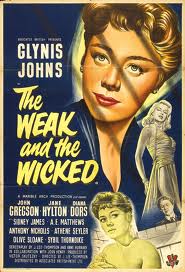The Weak and the Wicked
| The Weak and the Wicked | |
|---|---|
 UK release poster | |
| Directed by | J. Lee Thompson |
| Written by | Anne Burnaby |
| Produced by | Victor Skutezky |
| Starring | Glynis Johns Diana Dors |
| Cinematography | Gilbert Taylor |
| Edited by | Richard Best |
| Music by | Leighton Lucas |
Release date | 18 July 1954 |
Running time | 81 min. |
| Country | United Kingdom |
| Language | English |
| Box office | £213,706 (UK)[1] |
The Weak and the Wicked (called Young and Willing in the United States)[2] is a 1954 British drama film directed by J. Lee Thompson based on the book by his wife, Joan Henry, starring Glynis Johns, and Diana Dors.
Based on a best-selling book and prison experiences of author Joan Henry, director J. Lee Thompson's prison saga explores the life of inmates behind bars where innocence is lost in the world of vice. Despite its pulpy pot-boiler title, the film settles for earnest social drama over melodrama.
Plot
Frank "women in prison" story that sympathetically tracks several inmates through their imprisonment and subsequent return to society. Some are successfully rehabilitated; some are not.
Female prisoners talk about the events that brought them there and each of their stories is detailed in a series of flashbacks; the upper-class Jean (Glynis Johns), the brash Betty (Diana Dors) and the pregnant Pat (Rachel Roberts). The film follows the inmates' progress behind bars; Jean's ordeal improves after some sympathetic bonding with her fellow inmates, followed by a move to an experimental open prison.
Cast
- Glynis Johns as Jean Raymond
- Diana Dors as Betty Brown
- John Gregson as Dr. Michael Hale
- Olive Sloane as Nellie Baden, inmate
- Rachel Roberts as Pat, pregnant inmate
- Jane Hylton as Babs Peters, inmate
- Athene Seyler as Millie Williams, inmate
- Jean Taylor Smith as Prison Governor (Grange)
- Cecil Trouncer as Presiding Judge
- Ursula Howells as Pam Vickers
- Edwin Styles as Seymour
- Sid James as Syd Baden
- Eliot Makeham as Grandad Baden
- Joan Haythorne as Prison Governor (Blackdown)
- Joyce Heron as Prison Matron Arnold
- Anthony Nicholls as Prison Chaplain
- Josephine Stuart as Andy, pregnant inmate
- Paul Carpenter as Joe, Bab's boyfriend
- Sybil Thorndike as Mabel Wicks, Millie's friend
- A. E. Matthews as Harry Wicks, Mabel's beau
- Barbara Couper as Prison Doctor
- Mary Merrall as Mrs. Skinner
- Marjorie Rhodes as Suzie, bigamist inmate
- Josephine Griffin as Miriam
- Simone Silva as Tina
- Thea Gregory as Nancy
- Tom Gill as Shop Assistant
- Herbert C. Walton as Blue Eyes, the gardener
- Irene Handl as Waitress
- Sandra Dorne as Stella
- Bessie Love as Prisoner
- Marjorie Stewart as Prisoner
- Hannah Watt as Prison Matron
- Margaret Diamond as Prison Matron
- Maureen Pryor as Prison Matron
- Ruth Dunning as Prison Matron
- Kathleen Michael as Prison Matron
Reception
The film was successful at the British box office.[1] According to the National Film Finance Corporation, the film made a comfortable profit.[3]
References
- ^ a b Porter, Vincent (2000). "The Robert Clark Account". Historical Journal of Film, Radio and Television. Vol. 20. p. 502.
- ^ Love, Bessie (1977). From Hollywood with Love: An Autobiography of Bessie Love. London: Elm Tree Books. p. 154. OCLC 734075937.
- ^ U.S. MONEY BEHIND 30% OF BRITISH FILMS: Problems for the Board of Trade The Manchester Guardian (1901-1959) [Manchester (UK)] 04 May 1956: 7
